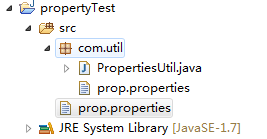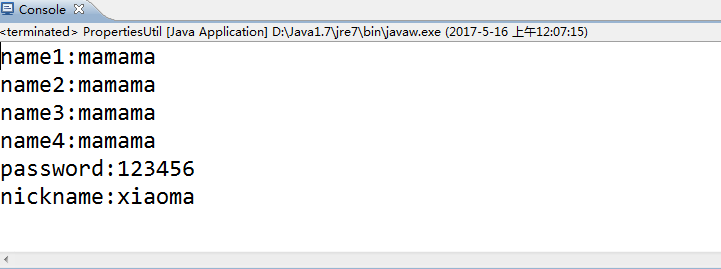java加载properties文件的六中基本方式实现
java加载properties文件的方式主要分为两大类:一种是通过import java.util.Properties类中的load(InputStream in)方法加载;
另一种是通过import java.util.ResourceBundle类的getBundle(String baseName)方法加载。
注意:一定要区分路径格式
实现代码如下:
1 package com.util;
2
3 import java.io.FileInputStream;
4 import java.io.FileNotFoundException;
5 import java.io.IOException;
6 import java.io.InputStream;
7 import java.util.Properties;
8 import java.util.PropertyResourceBundle;
9 import java.util.ResourceBundle;
10
11 public class PropertiesUtil {
12 private static String basePath = "src/prop.properties";
13 private static String name = "";
14 private static String nickname = "";
15 private static String password = "";
16
17 /**
18 * 一、 使用java.util.Properties类的load(InputStream in)方法加载properties文件
19 *
20 */
21 public static String getName1() {
22 try {
23 Properties prop = new Properties();
24 InputStream is = new FileInputStream(basePath);
25 prop.load(is);
26 name = prop.getProperty("username");
27 } catch (FileNotFoundException e) {
28 e.printStackTrace();
29 } catch (IOException e) {
30 e.printStackTrace();
31 }
32 return name;
33 }
34
35 /**
36 * 二、 使用class变量的getResourceAsStream()方法
37 * 注意:getResourceAsStream()读取路径是与本类的同一包下
38 *
39 */
40 public static String getName2() {
41 Properties prop = new Properties();
42 InputStream is = PropertiesUtil.class
43 .getResourceAsStream("/com/util/prop.properties");
44 try {
45 prop.load(is);
46 name = prop.getProperty("username");
47 } catch (IOException e) {
48 e.printStackTrace();
49 }
50 return name;
51 }
52
53 /**
54 * 三、
55 * 使用class.getClassLoader()所得到的java.lang.ClassLoader的getResourceAsStream()方法
56 * getResourceAsStream(name)方法的参数必须是包路径+文件名+.后缀 否则会报空指针异常
57 *
58 */
59 public static String getName3() {
60 Properties prop = new Properties();
61 InputStream is = PropertiesUtil.class.getClassLoader()
62 .getResourceAsStream("com/util/prop.properties");
63 try {
64 prop.load(is);
65
66 } catch (IOException e) {
67 e.printStackTrace();
68 }
69 return name;
70 }
71
72 /**
73 * 四、 使用java.lang.ClassLoader类的getSystemResourceAsStream()静态方法
74 * getSystemResourceAsStream()方法的参数格式也是有固定要求的
75 *
76 */
77 public static String getName4() {
78 Properties prop = new Properties();
79 InputStream is = ClassLoader
80 .getSystemResourceAsStream("com/util/prop.properties");
81 try {
82 prop.load(is);
83 name = prop.getProperty("username");
84 } catch (IOException e) {
85 e.printStackTrace();
86 }
87 return name;
88 }
89
90 /**
91 * 五、 使用java.util.ResourceBundle类的getBundle()方法
92 * 注意:这个getBundle()方法的参数只能写成包路径+properties文件名,否则将抛异常
93 *
94 */
95 public static String getName5() {
96 ResourceBundle rb = ResourceBundle.getBundle("com/util/prop");
97 password = rb.getString("password");
98 return password;
99 }
100
101 /**
102 * 六、 使用java.util.PropertyResourceBundle类的构造函数
103 *
104 */
105 public static String getName6() {
106 try {
107 InputStream is = new FileInputStream(basePath);
108 ResourceBundle rb = new PropertyResourceBundle(is);
109 nickname = rb.getString("nickname");
110 } catch (FileNotFoundException e) {
111 e.printStackTrace();
112 } catch (IOException e) {
113 e.printStackTrace();
114 }
115
116 return nickname;
117 }
118
119 /**
120 * 测试
121 *
122 */
123 public static void main(String[] args) {
124 System.out.println("name1:" + PropertiesUtil.getName1());
125 System.out.println("name2:" + PropertiesUtil.getName2());
126 System.out.println("name3:" + PropertiesUtil.getName3());
127 System.out.println("name4:" + PropertiesUtil.getName4());
128 System.out.println("password:" + PropertiesUtil.getName5());
129 System.out.println("nickname:" + PropertiesUtil.getName6());
130 }
131 }
文件路径:

prop.properties文件:
1 username=mamama 2 nickname=xiaoma 3 password=123456
输出结果:









